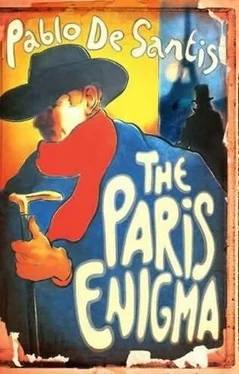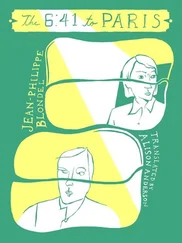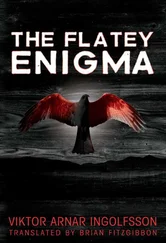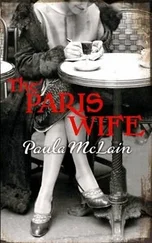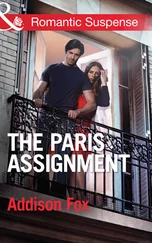Benito interrupted my tour through the cases.
“Did you read the news from Buenos Aires?”
“No.”
“Caleb Lawson has been spreading it around everywhere. In Buenos Aires they’re accusing Craig of murder.”
I was shocked for selfish reasons. Even though I was now working for Arzaky, I was Craig’s envoy. Anything that stained Craig’s reputation would stain mine. Mario Baldone had a newspaper. I took it out of his hands.
“Relax, Salvatrio. There was an accusation, but Craig will take care of disproving it.”
The news was written up in vague terms: the police had stopped searching for the magician’s killer in the gambling arena. They then began to look for an avenger in the victim’s circle. Alarcón’s family hadn’t hesitated in pointing a finger at Craig. The newspaper said that there was no proof that implicated the detective but that he, due to his convalescence for an unspecified illness, had refused to defend himself.
“You look pale,” said Baldone. “Here comes Arzaky. The Pole will take care of putting a stop to Caleb Lawson’s attack on Craig.”
I was looking at the cases, but my mind was elsewhere. There was the large chest of disguises belonging to Rojo, the detective from Toledo, which was chock-full of makeup and wigs and fake beards; Caleb Lawson’s anti-fog specs that he used to work at night in London; and Zagala’s wardrobe and nautical instruments that he carried with him when he boarded ships with their f lags at half-mast or boats abandoned in the ocean. Arzaky had contributed only a series of black notebooks filled with his tiny handwriting, which were displayed open. An empty case awaited Craig’s cane.
The Paris Enigma •187
“I’m leaving it for the last minute,” Arzaky had told me. “I want to use my friend’s cane for a few days. As if he were here with me.”
It made me nervous to see the impulsive Arzaky handling Craig’s cane, loaded and ready. I feared an accident.
The Japanese detective had chosen to show a wooden square filled with sand, accompanied by black and white stones. He called it the Garden of Questions, and he used it to study the relationships between circumstances and events. When anyone asked him what it was, he responded, “I sit on the f loor and contemplate it, and I move the stones as my thoughts move inside me. Then I take away the stones and I see the shape traced by their movements. That drawing sometimes tells me more than all the evidence and eyewitness accounts and clues, and all those other annoying details we detectives have to deal with.”
All the detectives were now in the center of the room, seated in armchairs. And we stood around them, their satellites, with one exception: Castelvetia’s acolyte.
“Hey, Baldone,” I said. “That guy over there, who can’t seem to make up his mind about coming in, isn’t that Arthur Neska?”
I pointed to a man dressed in black who stood behind a column. Baldone wasn’t surprised to see him.
“He keeps hanging around the hotel. They say he was sent by Darbon’s widow to see how the investigation is going. But I don’t think that’s true. If it were, he would try to make conversation, try to get us talking. And he hasn’t said a word. He just stands around staring at the detectives, especially at Arzaky. As if the acolytes didn’t exist for him.”
Neska’s situation perplexed me. And at the same time, in spite of the fact that I didn’t like him at all, it made me sad.
“If his detective dies, can an acolyte still keep coming to meetings?”
“No one has relieved him of his post. He’s like a ghost Darbon left behind. Besides, in these chaotic times, who would dare to throw anyone out? I would assume that the events here in Paris will lead to new rules.”
“Or perhaps he hopes to be named as Darbon’s successor,” I dared to say.
Baldone shook his head.
“No, nobody ever really liked Neska. He has the kind of negative charisma that causes people to dislike him before he’s even opened his mouth. Wherever he goes, women stop laughing and birds stop singing.”
Neska had now approached the cases and was looking at Darbon’s microscope as if it were a religious relic. Arzaky was asking everyone to be quiet, so Baldone had to whisper in my ear.
“I used to hate him, but now I feel sorry for him. He wants to cling to his old job; he wants to believe that he still has a mission. When the symposium ends, and everyone returns to their own countries, or to some city that murder leads us to, he won’t have anything to do, except tearfully put his mentor’s archive in order.”
Arzaky loudly asked everyone to come to order again. Magrelli was the first to speak. His words struggled to impose themselves upon the scattered conversations that continued. Everyone knew that the important stuff was what was said in the corners, not in the center of the room. The truth is a secret, and secrets are whispered.
“When we had our first meeting, ten years ago, only five of us were present. Craig was among us then, even though he’s not here today. We agreed on proposing locked-room cases as the highest art in our field, but those types of crimes are now a thing of the past. These days they don’t attract anyone’s attention. I want to propose, without forgetting the glory and prestige the locked room has given us, that we add the serial crime to the list of our greatest challenges.”
“I was there on that occasion, Magrelli,” interjected Lawson, “and I’m not willing to change what we established with so much effort and what made the formation of The Twelve Detectives possible. We founded an order, an orthodoxy, a set of rules. If we change one, we’ll end up unraveling them all.”
“Come on, Lawson,” said Castelvetia’s voice. He hadn’t stood up, and the fact that he was speaking from his armchair added a defiant note. “You just don’t want to hear anything about serial murders ever since the Case of the London Ripper.”
For a few seconds there was perfect silence. We knew that it was a difficult subject for Lawson, but for Castelvetia to be the one to mention it-he who had almost ruined Lawson’s reputation in the past-made us all feel in that moment that The Twelve Detectives was at risk of dissolving. What association, what club, could contain such wrath among its members-the hate in Lawson’s gaze and the disdain that Castelvetia’s words implied? Like so many other associations, The Twelve Detectives had functioned perfectly from a distance, through correspondence and reports. It had functioned well as long as there was the promise of a future meeting, a sum of handshakes and embraces sent over the ocean waves. But now, face to face, The Twelve Detectives’ fragility was showing.
We all knew that Lawson had worked with Scotland Yard on the investigation of the infamous murders by Jack the Ripper, who even twenty years after his heinous deeds is remembered, reviled, and destined to live in infamy-every wax museum still contains a hypothetical image of the killer. But in spite of his efforts to help the police, not one single well-founded arrest was made. There were plenty of suspects, but they all paled in comparison to the murderer’s audacity and savageness.
Caleb Lawson exchanged a look with his acolyte and kept quiet, as if obeying the Hindu. Why was he silent, why didn’t he respond to Castelvetia’s attack? It was clear to all of us that Caleb Lawson’s silence meant he had some sort of surprise in store for the Dutchman. The ace up his sleeve, I would find out later, was me.
“I don’t see why we can’t also include serial murder among our greatest challenges,” said Arzaky. “The series and the locked room complement each other perfectly. The locked-room crime happens on a very limited stage, but one with a very high potential significance, since any seemingly circumstantial element can end up in the evidence box: a pack of cigarettes, a key, a torn-up letter, or rope strands like in the case Castelvetia told us about during our first meeting. Serial crime, on the other hand, can spread throughout an entire city, one corpse here and another there, or even over a whole country, or the world. But the chain of signs is limited and one has to find a common pattern created by the killer’s obsession or intelligence. In a minimal setting, there is the maximum possibility of combinations; in a maximum setting, the minimum possibility of combinations. I propose that we consider both variants from now on, and that we don’t deem inferior the intelligence of a detective that takes on the challenge of a series of crimes to that of one who faces the famous locked door.”
Читать дальше
